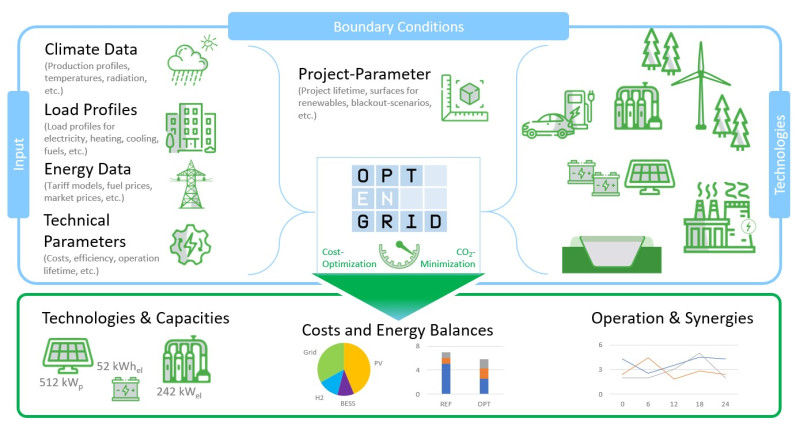OptEnGrid: Optimization of Heating, Electricity, and Cooling Services in a Microgrid to Increase the Efficiency and Reliability (OptEnGrid)
The Austrian scientific project „ Optimization of Heating, Electricity, and Cooling Services in a Microgrid to Increase the Efficiency and Reliability“ (OptEnGrid) is based on the work of Dr Michael Stadler at the Lawrence Berkeley National Laboratory at the University of California. It combines BEST's research in the field of heat with smart grid research from California.
The long-term aim of the research activities is to optimize energy and mass flows from a holistic point of view. Based on an internationally well proven system a systematic approach was developed. It will increase autarky of systems on all hierarchical levels (single buildings, settlements, sub-grids, regions) and in all energy sectors. This will reduce burden/pressure on supra-regional infrastructure. For this purpose, considerable attention was paid to the scalability of the developed tools.
The project results in measures for the considered test systems, concepts for the higher-level control system and in an evaluation of the economic potential. The work serves as a basis for a tool development from which the entire Austrian energy system should benefit in the long term.
Background
The coupling of the various sectors of the energy system, the consideration of energy grids and optimized operating modes of hybrid energy systems are regarded as important future topics in the field of energy research. Our energy system must change and stop using fossil fuels in order to slow down and finally stop climate change.
However, the increasing share of strongly variable renewable energies (sun, wind) puts a considerable strain on the power grid. This fluctuation necessitates balancing energy, which is often produced in a particularly "dirty" way for economic reasons (e.g. coal-fired power generation instead of uneconomical CHP plants). In principle, the European power grid is well developed. However, transport capacities are still limited by weaknesses of the grid. The construction of new high-voltage power lines is often problematic for landscape and environmental protection reasons. Therefore, it usually encounters massive protest from the population. Accordingly, the expansion progress of the power grid is slow.
Decentralization could be an alternative to the massive grid expansion. Producers and consumers must be coordinated with each other and energy for electricity, heating and cooling must be consumed at its generation. This requires optimal planning and flexible operation of these systems.
Results
The work serves as a basis for the development of tools from which the entire Austrian energy system should benefit in the long term. The project focuses on the development of new methods and on know-how transfer. The development of a concrete product, which is a long-term goal of the research work, should be the subject of follow-up projects after successful project implementation. The project results form the basis for tools that will help settlements and municipalities in future in the planning of new, but also in the expansion and optimization of already existing municipalities towards energy communities.
"The planning and optimization tool "OptEnGrid" is a tool in the course of the energy transition towards decentralized energies and renewable energy communities or microgrids. In future, the tool will help settlements and municipalities to plan new ones, but also to expand and optimize existing municipalities into energy communities." (Michael Zellinger)
Introduction:
https://drive.google.com/file/d/1H3MKw-PUlNX6ANQZFpDTxbALjqXhqrfh/view?usp=sharing
Description:
https://drive.google.com/file/d/1n6KGckTKks3EYOiGNnsThYrd06Vb8dSu/view?usp=sharing
Use Case Examples:
https://drive.google.com/file/d/1LH8ihMIePfvUan96btoDdgpNIFDzGVFM/view?usp=sharing
Projektlaufzeit
2017-04-01 - 2021-03-31
Supported by
3rd Call Energy Research Program
Projektpartner
- SOLID Solar Energy Systems GmbH
- World Direct
- Stadtwärme Lienz Produktions- und Vertriebs-GmbH
Area Management

Area Manager
Stefan Aigenbauer
stefan.Aigenbauer@best-research.eu

